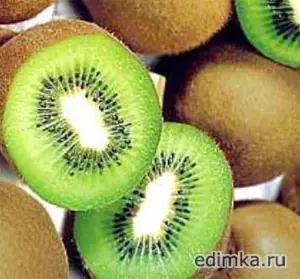Kiwi diet: A method of losing weight using an exotic fruit
Kiwi is not only a tasty and refreshing fruit, but also a valuable source of beneficial vitamins and substances. It turns out that kiwi can also be an effective tool for weight loss, especially when combined with low-calorie foods. In this article we will look at two popular variations of the kiwi diet: two-day and one-week.
Two-day kiwi diet
The two-day kiwi diet involves eating 1-1.5 kg of kiwi for 5-6 meals over two days. For best results, it is also recommended to drink unsweetened herbal teas, still table water or mineral water. Stick to your diet and drink enough fluids to reduce your thirst.
Weekly kiwi diet
A weekly kiwi diet allows you to lose about 2-4 kg of weight in 7 days. It is important to remember that this diet should not be extended beyond a week, however it can be repeated over time to maintain the results achieved.
Here is an example of a meal plan for a weekly kiwi diet:
Breakfast: Grapefruit salad, kiwi, 4 tbsp. l. oatmeal, green apple and 2 tbsp. l. sprouted wheat. It is recommended to season the salad with 120-150 ml of natural yoghurt.
Second breakfast: Grapefruit and orange juice, diluted 150 g. mineral still water, and 2 tbsp. l. sprouted wheat cocktail.
Lunch: Strawberry puree mixed with semolina dumplings and low-fat cottage cheese.
Afternoon snack: Cocktail of 150-220 gr. softened kiwi, 100 ml. natural yogurt, 1 tsp. whey and 1 tsp. pistachios
Dinner: 50 gr. low-fat cottage cheese mixed with sprouted wheat, yogurt and 100 gr. kiwi. As an option for variety, you can spread the bun with light butter, sprinkle with chopped mint and put 50 grams on top. homemade cheese and 100 gr. kiwi. As a drink, it is recommended to mix 150 g. berries, 1 tbsp. l. sprouted wheat and 200 ml. buttermilk
It's important to note that the kiwi diet can be an effective strategy for short-term weight loss. However, before starting any diet, it is recommended to consult a doctor or nutritionist. The kiwi diet can be low in calories and unbalanced, so long-term adherence to such a diet can lead to deficiencies in certain nutrients.
Kiwi is a valuable source of vitamin C, vitamin K, dietary fiber and antioxidants. It also contains folic acid, potassium and other micronutrients that are beneficial for health. However, kiwi does not contain all the essential nutrients, so mono-diets based only on this fruit may be nutritionally insufficient.
It is important to remember that losing weight and maintaining a healthy lifestyle is achieved not only through diet, but also through moderate physical activity and a balanced diet. It is recommended to include a variety of fruits, vegetables, proteins, healthy fats and carbohydrates in your diet.
Before starting any diet, it is recommended that you consult with a professional to assess its suitability for you and avoid potential health problems.



